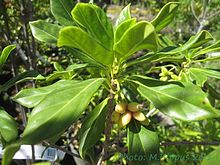Antirhea is a genus of flowering plants in the family Rubiaceae.[1]
| Antirhea | |
|---|---|

| |
| Antirhea borbonica | |
| Scientific classification | |
| Kingdom: | Plantae |
| Clade: | Tracheophytes |
| Clade: | Angiosperms |
| Clade: | Eudicots |
| Clade: | Asterids |
| Order: | Gentianales |
| Family: | Rubiaceae |
| Subfamily: | Cinchonoideae |
| Tribe: | Guettardeae |
| Genus: | Antirhea Comm. ex A.Juss. |
| Type species | |
| Antirhea borbonica J.F.Gmel.
| |
| Synonyms | |
Species
editAs of March 2023[update], Plants of the World Online accepted the following species:[1]
- Antirhea bifida (Lam.) I.M.Johnst.
- Antirhea bifurcata (Desr.) Benth. & Hook.f.
- Antirhea borbonica J.F.Gmel.
- Antirhea madagascariensis Chaw
Many species are now placed in the genus Stenostomum, including:
- Antirhea aromatica → Stenostomum aromaticum
- Antirhea jamaicensis → Stenostomum jamaicense
- Antirhea portoricensis → Stenostomum portoricense
- Antirhea radiata → Stenostomum radiatum
- Antirhea sintenisii → Stenostomum sintenisii
- Antirhea tomentosa → Stenostomum tomentosum
Distribution
editSpecies of Antirhea are native to Indian Ocean islands off Africa: Madagascar, Mauritius, Réunion, and Rodrigues.[1]
References
edit- ^ a b c "Antirhea Comm. ex A.Juss". Plants of the World Online. Royal Botanic Gardens, Kew. Retrieved 2023-03-20.
External links
edit